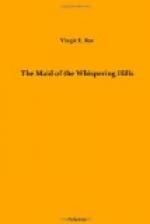The sweet wind of the Whispering Hills was very faint on her soul.
CHAPTER XXIX BITTER ALOES
Eight months passed over the country of the Assiniboine, bringing their changes. The short full-tide of the summer seemed to run out with the going of the venturers, and the autumn to come from the north-west in a night.
Great splashes of colour dropped on the land, spilled from the palette of some careless giant,—gold and crimson and purple. Glorious fires burned in the cooling skies and the sweet breath of autumn tingled in the air.
There was comment, and the shaking of heads among the old trappers. The wrong time of year to take the long trail with women,—the wrong time, but, bon Dieu! who was to stop that woman with the sombre eyes? Voila! A woman to thrill the blood in any man who was still warm with life!
“Love awakened in her would be a thing of flame and fury, they had thought, that long past day,” thought Pierre Garcon to himself; “he and that friend of his heart, Marc Dupre,—it had been a thing of patient servitude, of transcendent daring, and Marc Dupre; ah! He had been a part of it. But there was much of mystery about it all, and no one knew, nor would any know, all that it had meant.”
So the changes came and passed, and when Anders McElroy again opened his eyes to reason, the world was white against the pane of the one window of the little room,—the long snows had arrived. Winter was upon the Northland.
It was on a night when the wind without howled like a lost soul shut out from the universe and the sucking of the chimney-throat roared to heaven.
Edmonton Ridgar sat at the hearth gazing into the leaping flames, and Rette de Lancy passed and repassed among the shifting shadows, busy at some kindly task.
Long he lay, this man returned from the Borderland of the Unknown, and stared weakly at the familiar sights that were yet touched with a puzzling strangeness.
It seemed that this was all as it should be, and yet there was something lacking,—a great gap, whose images and happenings were wiped out as a cloth wipes clean a slate,—a space of darkness, of blankness, whose empty void held prescience of some great sadness. He lay on his side facing the fire, and twice he thought to speak to Ridgar with a question of this strangeness, and each time he was conscious of a vast surprise that the man did not answer.
His lips, so long unused to sane direction, had made no sound in the roar of the night.
And then Ridgar, drawn by that intangible sense of eyes upon him, raised his head; and, as their glances met, that great void flashed suddenly into full panoply of life peopled with a ring of painted faces against the background of a night forest, a leaping fire, and the heroic figure of a tall woman who stood in the dancing light and threw a hatchet at a painted post.




